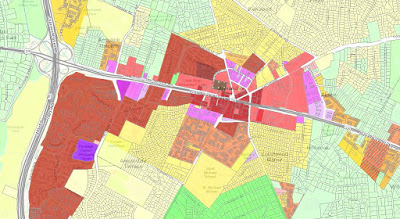Zoning changes under review, including new rules on Airbnb rentals
 |
| The Annandale area on the county’s zoning map. |
A new regulation on short-term rentals is likely to be the most high-profile of several changes in the Fairfax County Zoning Ordinance under consideration by the Department of Planning and Zoning.
Zoning Administrator Leslie Johnson described some of those changes at the July meeting of the Mason District Land Use Committee.
A provision on short-term rentals, such as those arranged through Airbnb and other online companies, is needed to accommodate a new state law that allows localities to regulate and establish a registry of homeowners who rent out their properties for short-term rentals, defined as less than 30 days at a time.
Currently, the Zoning Ordinance does not permit such uses in dwelling units and only allows short-term stays in hotels or bed and breakfast establishments, Johnson said.
The Board of Supervisors directed the zoning staff to draft regulations on short-term rentals that balance the interests of entrepreneurs and communities, safeguard local revenue sources, and mitigate land use impacts, she said.
The county has posted an online survey to gather feedback from the public on the regulation of short-term rentals. The deadline for completing the survey has been extended to Aug. 31.
Zoning staff has scheduled public meetings – Sept. 5 in Reston, Sept. 13 in Alexandria, and Sept. 25 in McLean – to discuss the survey findings and answer questions.
At the MDLUC meeting, Johnson said any HOA regulations on short-term rentals would take precedence over a county zoning ordinance.
Another zoning change under consideration would give the zoning administrator more flexibility to approve certain minor modifications, such as those relating to the replacement of façade materials and signage changes. Those changes must be in substantial conformance with the zoning approval and must remain true to the intent of the approved proffers and development conditions.
This provision would also allow the Board of Supervisors to act on certain minor changes as “an action item” at a BoS meeting. Examples of those changes include a minor increase in building height, minor modifications to yard dimensions and setbacks, and the addition of solar energy.
Other changes under review:
• The sign ordinance needs to be revised to comply with the U.S. Supreme Court’s 2015 decision in Reed v. Town of Gilbert (Arizona), which found sign ordinances that treat “content-based” signs separately from other types of signs violate the First Amendment’s clause on free speech.
Zoning staff is rewriting existing regulations in a content-neutral manner and will propose minor policy changes, including new rules for digital signs. After those changes are adopted, staff plans to review in-depth policy issues on signs, including permissible sign types, locations, and sizes.
• Another change under consideration would provide more flexibility for homeowners to install “hardscape” features, such as patios and pool decks, in their backyards. Current regulations limit such development to 30 percent of a rear yard.
A proposed amendment would increase that to 40 or 50 percent in residential districts and to 50 or 60 percent in planned development districts. It also calls for a new special permit for homeowners who want to exceed those limits.
• New updated definitions would be added for restaurants, primarily to make it easier for entrepreneurs to establish increasingly popular “fast casual” restaurants.
Restaurants, including fast casual restaurants and carryout restaurants would be permitted by right in most commercial districts. Drive-throughs would continue to require special exception approval.
A related proposal calls for revising the parking requirements for restaurants to be based on the square feet of gross floor area instead of the number of seats and employees.
• The current ordinance treats independent living facilities and assisted living uses separately. Now that those uses are increasingly combined in one facility, zoning staff is considering creating new categories called “continuing care communities” to accommodate a spectrum of institutional uses in a single development and another category for “adult day health care.”
• Another proposal calls for revising the zoning designations for agricultural uses to cover urban agriculture, community gardens, farmers markets, agritourism, container agriculture, and industrial composting.
In addition to changing several specific zoning provisions, zoning staff are undertaking a Zoning Modification (zMOD) Project to revise the format and structure of the entire zoning ordinance. The goal is to create a more streamlined, user-friendly document with charts and hyperlinks.

